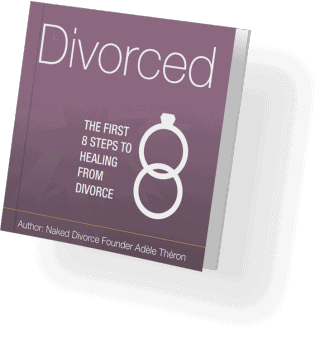
Free e-book: The First 8 Steps to healing from divorce

Do you often feel let down or undermined by your partner, or that they’re deliberately trying to wind you up or push your buttons?
Do you find yourself lashing out? Shouting? Swearing at them? Treating them in ways you never could have imagined you would when you first fell in love? If so, it sounds like you have a build-up of resentment that you urgently need to address.
What’s more, it sounds like that resentment is crushing your capacity for compassion, turning you into someone I’m sure you don’t want to be: someone who is emotionally abusive.
Who’s to blame?
Part of the problem is expectations. We live in a culture of entitlement: one that tells you over and over again that you deserve to be happy, to feel good about yourself, to feel attractive and valued and successful and loved. All of which is great. But what happens when we don’t feel happy, or good, or attractive, or successful, or lovable?
We turn to the people around us – those that we feel are supposed to be making us feel all these things – and we chastise them for their failure. But other people aren’t perfect. They don’t know exactly how to manage you to help you be your best self. How can they, when you don’t know either, half the time?
Your emotional state isn’t always rational or readable. There isn’t always a direct, obvious reason why you’re stressed or upset. And if there is, it isn’t always your partner’s fault – for creating it, for misreading it, or for failing to change it. And why should they, necessarily?
It’s important to be emotionally supportive when someone really needs you, but do you really need someone to hold your hand through every dip in your mood? Is it always someone else’s responsibility to “fix” you when you’re feeling irritable?
Sometimes – if you’re really honest with yourself – could you be making a mountain out of a molehill? Do you always need to drag everyone else into the mess? After all, you and your partner both have your own crap to deal with. You don’t spend every waking hour trying to figure out how they’re feeling and how you can best be of service to them, so expecting that back seems a tad unreasonable.
(Again, this is not an excuse for letting people down on the emotional front. Everyone needs to and should be willing to provide their partner with emotional support. But that doesn’t mean someone else needs to be your crutch for every single step you take. You do need to learn to walk by yourself, too.)
But I digress.
Break the cycle
Let’s get back to why, exactly, we become so quick to lose our temper with our partners and where this resentment really comes from. At its root, it’s about compassion. Not just for your partner, but for yourself. That’s the great irony of lashing out at people we love — so much of it boils down to something we deeply dislike in ourselves.
In essence, you overreact because you’re over-sensitive about some perceived fault or weakness in your own personality.
Rather than treating yourself with compassion, rather than being gentle with yourself about this thing you’re so ashamed of, you jump to the opposite end of the scale: anger.
You’re furious that you feel wounded – and you reflect that back at the person who (often inadvertently) caused the sting. The worst thing is, because you’re constantly telling yourself that you’re the victim, once you start on the path of emotional abuse, it becomes a vicious cycle.
Picture this: your partner says or does something that hits a nerve and you explode at them. You feel kind of guilty for speaking to them like that, but rather than admit it, you tell yourself that they were deliberately getting at you, and that they are in the wrong.
With every passing comment, every perceived slight, every failure to do something the way you’ve asked, you take as proof that they’re trying to undermine you – everything becomes about you.
And the more nervous or evasive or shut down they become, the more you tell yourself they are trying to punish or hurt you more, the more cruel you become in return. And, of course, the more torn you are between being adamantly self-righteous, and getting that sick feeling in the pit of your stomach that you should be very, very ashamed of your behaviour.
Sound familiar? If so, it’s time to stop the cycle.
First, take a deep breath. That response on the tip of your tongue? Ask yourself: what’s motivating it? Do you want to escalate the situation, or diffuse it? The way you respond is everything. Express yourself calmly.
If your express purpose is to humiliate, demean or silence the other person (particularly in front of someone else – and especially in front of your children), you will hate yourself for it later. Physically stop yourself and reword your reply.
Ask yourself, “Do they have a point? Am I reacting angrily out of habit? What’s to be lost by biting my tongue and listening to what they have to say? If these words were coming from my mouth, how would I want my partner to react?”
Don’t try to crush your emotional response, but don’t automatically attribute it to your partner. If this gave you a stab of anger, hurt, tearfulness, stress, jealousy – categorise the response and ask yourself why?
Don’t berate yourself for your response, just try to understand it. Question, too, whether your partner could reasonably have known how this would make you feel. Are they really trying to hurt or annoy you, or are blaming them for a feeling you already have locked away?
If you think they are being deliberately insensitive, or if they keep making the same blunder, explain why. Screaming, swearing or name-calling won’t help.
Finally, apologise. Even if you felt your partner was out of order, if you’ve responded in a way that way cruel, abusive or derogatory, that’s going to create a whole new layer of resentment in your relationship. It’s not worth it.
You’re perfectly entitled to stand by your feelings – to reiterate, again, why their words had such an impact – but if you crossed the line, you must say sorry for the way you expressed yourself. Without this, you’ll go on repeating the cycle again and again.
If you enjoyed this post, I’d be very grateful if you’d help it spread by emailing it to a friend, or sharing it on Twitter or Facebook.
With you in service

 Book a Clarity Call for any divorce or break up support you need,
Book a Clarity Call for any divorce or break up support you need,

